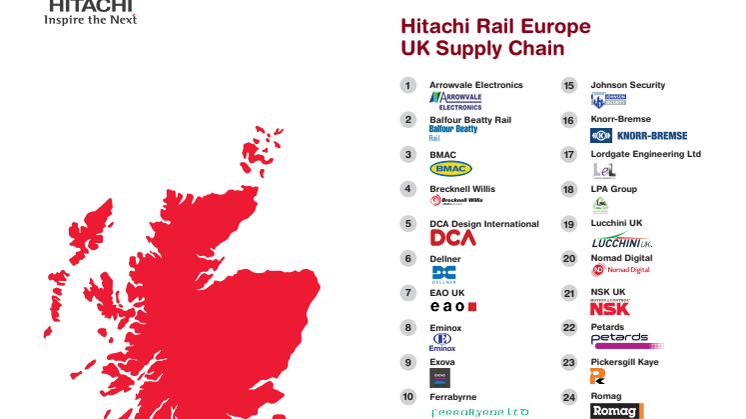
Press release -
Hitachi Rail Europe shows its firm support for Yorkshire suppliers in building new Class 800/801 trains
London, September 9, 2014 – Hitachi Rail Europe Ltd. today announced that it is working with over 30 UK-based suppliers to build trains for the first phase of train delivery for the Government’s Intercity Express Programme.
Of those parts, systems and operations that Hitachi Rail Europe could have sourced from the UK for the new trains, 72% have indeed been purchased from UK-based businesses.
This includes lighting from Normanton-based LPA Excil, lock systems from Pickersgill –Kaye, located in Leeds, and track circuit actuators from Doncaster-based Unipart.
The confirmation comes as the rolling stock provider published a map highlighting the locations of its various manufacturers across the UK. It shows that the company’s supply chain is drawn from many different regions, including three businesses from Yorkshire and the Humber, three businesses from the North East, and four from the North West.
Today’s announcement cements the company’s commitment to supporting UK businesses and developing the rail supply chain. Following the announcement earlier this year that Hitachi Rail would be moving its global HQ to London, this is another sign of its confidence in the growing UK rail sector.
Jamie Foster, Procurement Director at Hitachi Rail Europe, said: “We are delighted to be working with so many suppliers from across the UK in building our new Class 800 series trains for the Intercity Express Programme. Given the high requirements for quality and reliability in our trains, we were keen to work with companies that share our values in this regard. I cannot emphasise enough the high quality and quantity of services our suppliers have provided on the project thus far. We will continue working closely with each of them across the rest of the manufacturing and delivery schedule.”
A representative from LPA Excil, said: “Class 800 is a very prestigious contract and a valuable asset in a company’s reputation. This allows us a greater volume of procurement and ultimately more cost-effective solutions to the rail industry.”
-Ends-